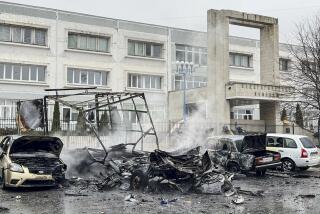Bombings rip through Iraq, reportedly killing at least 25
More than two dozen people were reportedly killed Monday in a string of bombings across Iraq that appeared to include sectarian and anti-government attacks.
The deadliest of the bombings occurred in the village of Mouafaqiyah, northwest of Baghdad, where seven were slain and 11 were wounded, police officials told the Associated Press. The village is populated by the Shabak, an ethnic group with their own language and religious beliefs.
Other reported explosions struck buses carrying religious pilgrims to Samarra, rocked downtown Baghdad, killed police at a checkpoint west of Tikrit, and devastated the northern town of Tuz Khormato bordering Kurdish territory, the same area where Kurdish guards and Iraqi police clashed last month.
“The bombers are trying to stir tensions, but we are telling them we will be more unified by these attacks,” Tuz Khormato Mayor Shalal Abdul told Reuters. He said the five dead there included three children.
As of late Monday, the death toll across Iraq had hit 25, according to the Associated Press. Dozens more were reported wounded.
The explosions are a sign of the tensions simmering in Iraq nearly one year after the exit of U.S. troops. No armed group immediately said it was responsible for the attacks, according to news service reports, but outside analysts say mounting violence has been fueled by spiraling tensions in the Kurdish north and as Sunni Arab militants try to reassert control across the country.
Kurdistan, an autonomous region of Iraq with its own militia, has been locking horns with the central government over oil rights and security forces in a set of disputed territories. A deal between Exxon Mobil and Kurdish authorities to drill in contested areas put the longstanding argument into play. Kurdish leaders have also stepped up talk of declaring independence, to the dismay of Iraqi Arabs.
In the past, U.S. troops had buffered disputes between the Iraqi military and the Kurdish militia, serving as an “honest broker” between the two sides when accidental shootings or other conflicts erupted, said Stephen Biddle, professor at George Washington University.
Their absence creates a “flash point,” he said.
Tensions are expected to grow in coming months in the run-up to local elections, as Kurds and the central government compete for political backing in the contested areas. Experts say Kurds are trying to marshal a strong showing to buttress their claims; Prime Minister Nouri Maliki is trying to win Arab votes by casting himself as the leader who will stave off Kurdish occupation.
“Any time the prime minister is seen as being tough on the Kurds, it works very well with both the Iraqi Sunnis and Shia community,” said Kenneth Pollack, a senior fellow at the Brookings Institution’s Saban Center for Middle East Policy. “He wants to be seen as a nationalist prime minister who represents all of Iraq,” Sunni and Shiite -- who can be united together against the Kurds, he said.
As the local elections in April draw closer, “we should expect similar attacks to take place and target these northern provinces, which are the theater of the competition between the two sides,” said Maria Fantappie, an Iraq analyst with the International Crisis Group.
Sunni militants, meanwhile, appear to be reprising their onslaught of attacks of six years ago in an attempt to debilitate the Shiite-dominated Iraqi government. Sectarian tensions and attacks have surged with Sunni fears that Maliki is marshaling power to become “a Shiite Saddam Hussein,” Biddle said. Al Qaeda in Iraq has historically attacked Shiite religious pilgrims, one of the targets of the Monday bombings.
Some believe that the Al Qaeda affiliate was also behind the attacks in the contested regions, rather than the players in the Kurdish dispute themselves. “This is almost certainly Al Qaeda in Iraq just trying to sow chaos,” said Douglas Ollivant, a senior fellow with the New America Foundation. “It has all their fingerprints on it. But this is new -- I don’t remember them striking in Kurdish areas before.”
Though violence has been on the upswing this year in Iraq, experts say it is still nowhere near the heights of 2006 and 2007. Shiites have not retaliated against Sunni attacks with the death squads of years past, a promising sign that they aren’t holding ordinary Sunnis to blame for terrorist attacks, Ollivant said.
Since the departure of American troops, “you can look at it and say, ‘It’s been a year and the country hasn’t fallen apart,’” Pollack said. “You can also look at it and say, ‘It’s been a year and violence has increased and all the parties are at each others’ throats.’”
ALSO:
Afghan explosions take deadly toll
Car bomb kills 17 in crowded market in Pakistan
Japan conservatives win landslide election victory
More to Read
Start your day right
Sign up for Essential California for news, features and recommendations from the L.A. Times and beyond in your inbox six days a week.
You may occasionally receive promotional content from the Los Angeles Times.






